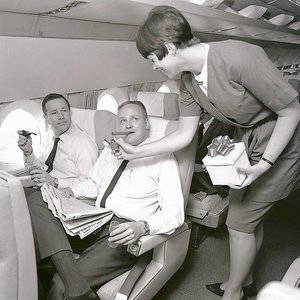A little while ago I was waiting in a queue to change some money at Haneda Airport when I noticed a strong smell of tobacco. At first I thought it was coming from someone nearby, because the clothes of a heavy smoker can reek of tobacco, but then I realised I was standing outside the Smoking Room. Periodically, the door would open and close as people went in and out, allowing the fumes from inside the room to pollute the air in the vicinity where I was standing. This set me pondering further on a matter to which I have already given much thought: why do smokers—at any rate those about to board an aeroplane—smoke?
Clearly, it’s not because of enjoyment. Rather the opposite. Smoking being rightly forbidden in most of the terminal building, and of course on the aircraft itself, these unfortunate people who are addicted to the nicotine in cigarettes are topping up their nicotine levels in the hope it will last until they land at their destination, maybe many hours later. They may for this reason smoke two or three cigarettes one after the other and put up with the dizziness and nausea that this can cause. Some smokers use nicotine patches to help them survive the flight.
It’s similar to the situation of Japanese office workers on their way to the station in the mornings. They’re not allowed to smoke at home or on the train, so they top up their nicotine levels while they have the opportunity—even though it’s forbidden to smoke while walking along the street in many areas of Japanese cities. I have frequently observed such smokers. Do they look happy and content? No, they look harried. But why?
The answer to the above questions is the same for the person about to board an aircraft as for the Japanese ‘salaryman’ on his way to work: fear—of what may happen if they can’t smoke. Well, what does happen if a smoker can’t smoke when he or she wants to? I’ve asked hundreds of smokers this question and at first they usually say ‘nothing’ or ‘I don’t know’. Then, after some thought, many will admit to feeling mildly uncomfortable, that is, irritable and nervous. These feelings are due to nicotine withdrawal. If they’re not relieved by smoking another cigarette, what will happen? Will they become intolerable? The answers are ‘nothing’ and ‘no’, respectively.
But it’s not so simple as that. Many—or I might say all smokers—even if they’re not really conscious of it, are afraid the discomfort will become intolerable: that’s why smokers smoke (if they’re allowed to), whatever they’re doing or are about to do.
It gets worse. Unfortunately for them, smokers who desperately try to top up their nicotine levels before boarding an aircraft are ensuring that when they land they’re going to feel even more uncomfortable than they did before they got on the plane. This is from the larger dose of nicotine they took in than they normally would, and the enforced longer period before the withdrawal symptoms can be relieved by another dose.
Many smokers, however, if they put their mind to the reality of not being allowed to smoke on board an aircraft, accept it and forget about smoking for the duration of the flight—and they are perfectly all right.
The lessons from this, which contain the key to successful quitting, are as follows:
- Smoking is not enjoyable or relaxing
- On the contrary, smoking causes anxiety, nervousness and irritability
- These symptoms, nonetheless, are mild
- The fear that they will become intolerable is real, if unconscious
- If smokers do nothing, these symptoms will go away
The only thing that smokers will lose by not smoking is their fear of not smoking.
And if you need help to return to the happy state of being a non-smoker, you can find it here.
Text © Gabriel Symonds


Leave A Comment